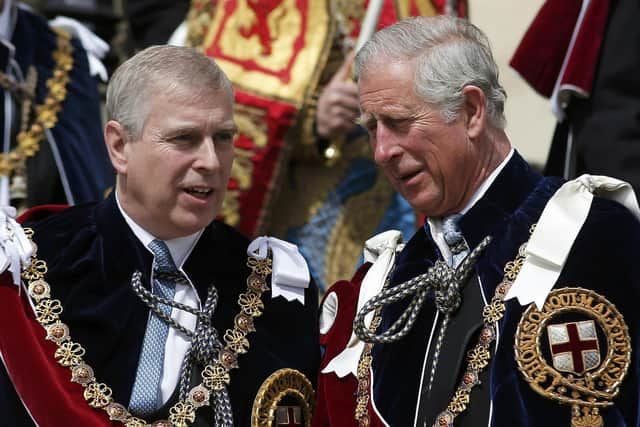Queen's death: What lies in store for Andrew during reign of King Charles III?
Charles is now the new King and any decision about Andrew, disgraced after paying out millions over a civil sexual assault case, will fall to him, no doubt in consultation with his eldest son and heir, the Duke of Cornwall and Cambridge.
Royal author Robert Jobson wrote that William had, unlike Charles, cut off all contact with his uncle.
Advertisement
Hide AdAdvertisement
Hide Ad“There will be no public role or comeback for York, if the Duke of Cambridge has any input on the matter – and let me assure you, he does,” a source told Jobson.


“He should be banished, as far as Prince William is concerned.”
But Andrew’s place in the family remains as the royals grieve for their matriarch.
The duke rushed to his mother’s bedside at Balmoral on Thursday, joining Charles, the Princess Royal, the Earl and Countess of Wessex and Camilla, now Queen.
It was William who drove Andrew, who sat in the front passenger seat, with Edward and Sophie in the back, to the Queen’s Scottish home after their RAF flight landed in Aberdeen,
Charles will have to decide whether to fund his brother’s lifestyle, as the Queen did.
Andrew is believed to have received an annual salary from the Queen’s £21 million-a-year private Duchy of Lancaster income.
The Duchy’s assets are held in trust for the sovereign, so are now under Charles’s control.
Advertisement
Hide AdAdvertisement
Hide AdQuestions will also be raised about Andrew’s home, Royal Lodge in Windsor Great Park, which is a Crown Estate property, and also houses his ex-wife Sarah, Duchess of York.
The duke signed a 75-year lease on the mansion in 2003, but could potentially receive millions in compensation for refurbishment costs he carried out if he gives up the 31-bedroom home.
There are also likely to be further calls for Andrew to be stripped of his dukedom, severing his connection to the city of York.
But peerages can only be removed by an act of Parliament – although there are also limited circumstances in which hereditary peerages can be renounced by the holder.
Andrew also remains in the line of succession, and is still a Counsellor of State.
In the event a monarch cannot undertake their official duties as sovereign on a temporary basis due to illness or absence abroad, two or more Counsellors of State are appointed by Letters Patent to act in their place.
The role is undertaken by any spouse of the monarch, Camilla, now Queen, and the next four adults in the line of succession, currently William, Harry, Andrew and the newly added Princess Beatrice.
The arrangements can only be changed with legislation, but the fresh inclusion of Camilla and Beatrice could mean it is less likely this route is explored.
Advertisement
Hide AdAdvertisement
Hide AdAndrew, grieving for his mother, will make an appearance at the Queen’s funeral, and is likely to process behind her coffin and join a vigil around it with his siblings while it lies in state.
He is likely to want to pay a public on-camera tribute to the Queen, just as he did for his father, the Duke of Edinburgh.
But Charles and William are expected to want the aftermath of the Queen’s funeral to signal the end of Andrew’s public appearances.
Comments
Want to join the conversation? Please or to comment on this article.